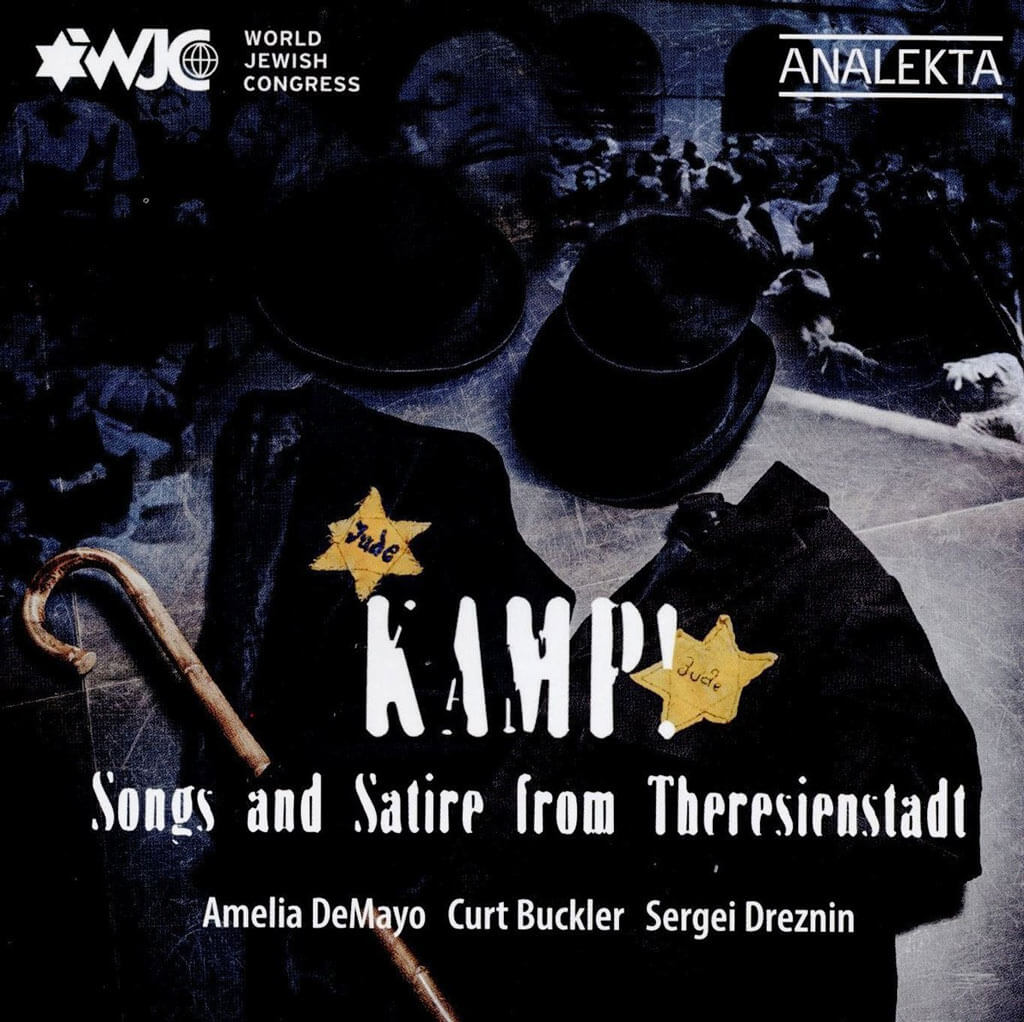
KAMP! Songs and Satire from Theresienstadt. Amelia DeMayo. Curt Buckler. Sergei Dreznin. Analekta AN2 8789. Total Time: 64.15.
What is “Kamp!”? Cabaret music from one of the most notorious of all Nazi concentration camps? Some kind of cruel joke? Black humour at its worst?
Well…yes…it is cabaret music, it is from one of the most notorious of all Nazi concentration camps and it is black humour, but… black humour generated by the inmates themselves and, as such, a testament to the resilience of the human spirit.
This new recording documents the words and music created by some truly courageous men and women under the most horrendous conditions imaginable. As demagogues around the globe do their best yet again to fan the flames of hatred against whole races, religions and ethnic groups, it doesn’t hurt to be reminded of where those roads can lead, and how quickly innocent lives can be destroyed.
Theresienstadt (or Terezin) was built-in the late 18th century by the Empress Maria Theresa as a symbol of Hapsburg power in Bohemia. It was later used as part of the Hapsburg defence against Napoleon in his quest for European domination. In 1941, the Nazis turned the fortress into a transit camp for Jews, on their way to death camps as part of “the final solution.”
Theresienstadt also became known as the place where the Nazis sent some of Europe’s most famous musicians, composers and cabaret stars. When, in spite of the deplorable conditions under which they lived, many of these artists continued to create new works, the Nazis realized they had a useful propaganda tool in their hands. They encouraged the formation of orchestras, bands and choirs in the camp and put out the impression that Jewish intellectuals were perfectly happy in Terezin. They even likened it to a spa, where Germans and Austrians spent huge sums of money to amuse themselves while on vacation. The Nazis went so far as to invite International Red Cross inspectors to tour Theresienstadt to see for themselves how well they were treating their Jewish “guests, ” and in 1944, well-known German Jewish actor and director Kurt Gerron produced a film about Theresienstadt under Nazi supervision/coercion. Shortle after completing the film Gerron was shipped off to Auschwitz. His film survived.
As the Allies stormed into Europe on June 6, 1944, the transfers from Theresienstadt to Auschwitz continued. By October ’44, more than 18,000 inmates had been transferred to Auschwitz. Only 1,574 survived. On May 3, 1945, the International Red Cross took over Theresienstadt and the long night of horror was finally over.
This is not the first recording to honour the composers and artists of Theresienstadt. Decca had already released an excellent series (6/10/2008) devoted to the music of Viktor Ullmann, Pavel Haas, Gideon Klein, Hans Krasa, Erwin Schulhoff and others under the title “Entartete Musik” (Degenerate Music), a derogatory term used by the Nazis to dismiss any kind of forward-looking “modern” music. In Toronto, several composers have produced deeply moving works based on poetry and other texts written by Terezin inmates. Srul Irving Glick’s I Never Saw Another Butterfly was recorded by Maureen Forrester (www.amazon.com). Ruth Fazal has given us Oratorio Terezin available at www.ruthfazal.com.
Austrian actor Alexander Waechter researched Terezin’s cultural legacy and put together a cabaret show based on songs composed by the inmates, the first performances of which, since the war, were given in October 1992. The show’s music director, pianist Sergei Dreznin, presided over an English version two years later in Boca Raton. Later, with the singers heard on this recording, Dreznin began touring the production throughout the United States.
This Analekta recording, made in 2015 under the sponsorship of the World Jewish Congress, features 25 cabaret songs based on texts by Terezin inmates, including Leo Strauss, son of Oscar Straus, the composer of the operetta The Chocolate Soldier, Ilse Weber, Karel Svenk, Walter Lindenbaum and Hans Hofer. These texts were set to music mostly by Sergei Dreznin and Viennese cabaret authority Gerhard Bronner. In the case of “The Chefs are Coming,” the text is by Leo Straus with music by his father Oscar Straus from The Chocolate Soldier. The song “The Butterfly” is based on a poem by Pavel Friedmann – the same poem Srul Irving Glick used in his song cycle I Never Saw Another Butterfly – written during his incarceration in Terezin with music composed for KAMP! by Gerhard Bronner. Nearly all the texts in KAMP! – some are sad or bittersweet, others bitingly satirical – refer to the conditions in Terezin and the plight of the Jewish inmates.
The music of KAMP! recalls Vienna or Berlin’s popular 1930s “cabaret style”, with performances by Ameli DeMayo, Curt Buckler and Dreznin setting exactly the right tone for the period and representing compellingly the resilient spirit of the thousands of innocent people who suffered at Terezin.
#LUDWIGVAN
Want more updates on Toronto-centric classical music news and review before anyone else finds out? Get our exclusive newsletter here and follow us on Facebook for all the latest.
- SCRUTINY | TSO Lets Berlioz Do The Talking In Season Opener - September 21, 2018
- RECORD KEEPING | Even Yannick Nézet-Séguin Can’t Make Us Love Mozart’s La Clemenza di Tito - September 6, 2018
- RECORD KEEPING | Giovanna d’Arco With Anna Netrebko Explains Why The Best Operas Survive - August 30, 2018



